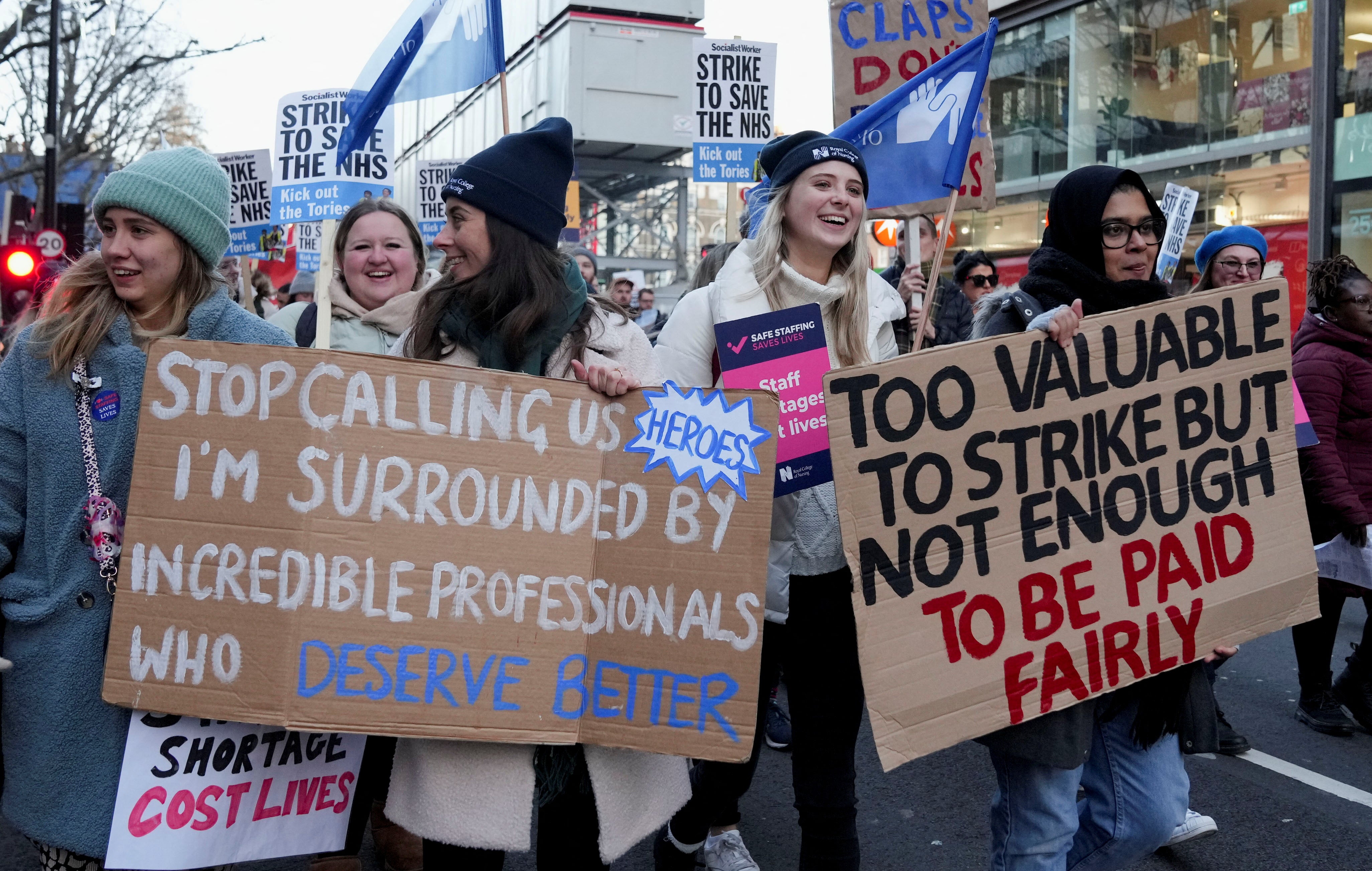Making nurses feel valued is a small price to pay for a healthy NHS
Editorial: The government has a difficult balancing act between rewarding public sector workers – and keeping control of public spending

What we need to know about the government’s new law to require minimum service levels during strikes is that the number of patients waiting more than 12 hours in A&E has exceeded 50,000 a week for the first time, as The Independent reports today.
The idea that the crisis in the National Health Service demands legislation that allows nurses to be sacked if they go on strike without ensuring emergency cover is the wrong approach. We need more nurses, not fewer, and if that requires a relatively small amount of additional public spending, then so be it.
Rishi Sunak seems to be pursuing a twin-track approach to the threat of further strikes in the public services: dangling the carrot of a possible one-off or backdated payment in front of the nurses in particular, while brandishing the stick of anti-strike legislation behind all public-service workers, whether or not they are employed in the public sector.
As a negotiating tactic, it is likely to be counterproductive; but more than that, it is wrong in principle to use legislation as a bargaining chip. There is no need for the Strikes (Minimum Service Levels) Bill, which Grant Shapps, the business secretary, published today. The law on industrial relations reached a state of equilibrium at the turn of the century, after the Thatcher government rolled back excess trade-union power in the 1980s, and after the Blair government corrected that overcorrection by improving the right to union recognition.
The government has a difficult balancing act, between rewarding public-sector workers for their hard work in often very challenging circumstances, and keeping control of public spending at a time of impending recession.
But for Mr Sunak and Mr Shapps to pretend that the law is now somehow unbalanced in the unions’ favour, and that this bill is needed in order to “restore the balance”, is political game-playing. The unions have been driven to strike action by their members, with the support of the general public, in response to unusually deep cuts in real pay that have been caused by inflation.
Angela Rayner, whose many roles include being Labour’s spokesperson on employment, is wrong to suggest that inflation is the government’s fault, but she is right to point out that this illiberal and unworkable legislation is the wrong response to a problem caused by the economic climate. It is illiberal because, despite Mr Shapps’s protests that the government supports and defends the right to strike, this bill is designed to curtail that right. It is unworkable because the unions will rightly defend individual workers who are sacked for striking outside the terms of the law.
Stephen McPartland, the Conservative MP for Stevenage, has said the bill is “shameful, shameful, shameful” for conferring the power to sack individual workers rather than simply to fine their unions.
But the bill is also unworkable in the sense that it is unlikely to make it on to the statute book in anything like its current form. The House of Lords will not regard itself as bound by the Conservatives’ promise in their 2019 manifesto to “require that a minimum service operates during transport strikes” for those parts of the bill that apply beyond the transport sector. In the health service, for example, the Royal College of Nursing – the nurses’ union – is already guaranteeing minimum service levels during strikes.
The new data that we are publishing now about record A&E waits will only add to the evidence of a deep crisis. The Independent last month revealed that 500 deaths a week are linked to delays in emergency treatment. The latest figures for excess deaths, running at 1,500 in the final week of last year, confirm that we are paying a price in lives for the coronavirus backlog on top of existing undercapacity.
Mr Sunak says that he has to take a wider view of the need to regain control of inflation, and he is right that this must be borne in mind. But the overriding priority is for the NHS to regain control of demand for healthcare. We need more nurses, which means paying them enough to retain their services. This bill is a distraction from that priority.



Join our commenting forum
Join thought-provoking conversations, follow other Independent readers and see their replies
Comments